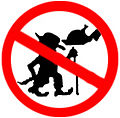aNewDomain.net — Trolls, the hate-spewing denizens of Internet comments, chatrooms, forums, and pretty much everything everywhere, have finally been profiled. University researchers have identified trolls as having sadistic motives and mindsets. And everyone, Oscar candidate to teenager, has at some point encountered a troll.
While trolls seem to be hurtful and malicious, the reactions and interactions with them vary from person to person. Many people turn off their phone or app and block an abuser, but some people have a love-hate (bordering need) relationship with social media. It is not easy to just turn off your Twitter, Instagram, or Facebook feed. Some rely on the support and admiration of followers and fans. And some fans rely on their stars for direction in life.
Yet, as we all know, the social medium can open an individual up to devastating abuse.

Image credit: Flickr
This is especially true for women.
I’m by no means a raging feminist but find level of sexual harassment women experience for merely expressing opinions on Twitter disgusting. 2:23 AM – 10 Feb 2014
Women reporters are especially vulnerable in covering sports. The abuse of women reporters takes shape in many different forms in the testosterone-fueled sports environment.”It’s hard enough when you’re a young reporter, let alone female too,” Laura Williamson, football writer at British tabloid newspaper Daily Mail, told CNN. “Whenever I get a good story then I have to cope with people thinking that I sleep around, and that’s horrible.
The Troll Profile
Researchers have defined a specific set of well-known personality traits to identify trolls and troll-like behavior. In particular, they explored whether trolls reported the personality traits of:
- Machiavellianism – willingness to manipulate and deceive others
- Narcissism – grandiosity and entitlement
- Psychopathy – lacking remorse and empathy
- Sadism – taking pleasure in the suffering of others
Canadian researchers from three Universities found clear evidence that trolling is associated specifically with self-acknowledged sadism (and to a lesser degree with Machiavellianism). People who reported sadism tended to troll specifically because they found it to be pleasurable. As the researchers concluded: “Sadists just want to have fun … and the Internet is their playground!”
Starts Early and Continues Later On
Not only does the trolling start much too early these days, but those tendencies don’t fade away. How is a teenager supposed to react when called these names?
The findings show, most worryingly, that cyber-trolling is an “Internet manifestation of everyday sadism,” rather than merely an online phenomenon. Teenagers that learn to troll and abuse like this early in life will harass those in the virtual and real worlds for years to come.
All this begs the question: Do we need more accountability for social media companies? They don’t propagate the trolling but they certainly allow it by not blocking comments or users. Should they take responsibility for the unbridled negativity their sites spread?
Personally, I believe those who abuse others online in a systemic and damaging way should be criminally liable and banned for life from the social media forum.

Image credit: thelaughingsquid.com
Should We Out Trolls?
We may need to start recording evidence and consider whether or not to involve the police. If it is a one-off, provocative contact from an unknown person, it may be a troll looking to provoke you. The best thing to do, in that scenario, is simply ignore the hate.
However, trolls should be reported to the website host in any situation where there is an explicit threat or where a person feels scared by the troll’s behavior. Repeated contact, directed at an individual, is harassment. The most appropriate thing to do is to save the evidence (take a screenshot and print it) and take it to the police.
People can also consult websites such as Cybersmart, Wired Safety, Comparitech, Halt Abuse and the Stalking Resource Centre.

Image credit: Wikimedia Commons
Here are five things you should do to avoid too much damage, courtesy of ReelSEO:
- Never, ever say something hateful back.
- Find a way to be funny without (obviously) cutting the other person down.
- Agree with them in a humorous way.
- Let your fans handle it.
- Comments can be fun: Use them for good.
Trolling is a growing phenomenon and major issue in our cyber world. Let’s be real about its effects and take informed steps to curtail any abuse we experience or see.
For aNewDomain, I’m David Michaelis.
Based in Australia, David Michaelis is a world-renowned international journalist and founder of Link Tv. At aNewDomain.net, he covers the global beat, focusing on politics and other international topics of note for our readers in a variety of forums. Email him at DavidMc@aNewDomain.net.














[…] (just as privacy can be essential for freedom of association). Others, such as myself, argue that “trolls” ought to be held accountable for threatening or offensive comments. You may have different positions on anonymity depending on whether you are expressing a political […]
[…] recent research has been profiling such haters and trolls. According to research, these individuals often display telltale sadistic motives and mindsets. You know the type. Everyone, Oscar candidate to teenager, has at some point encountered a […]